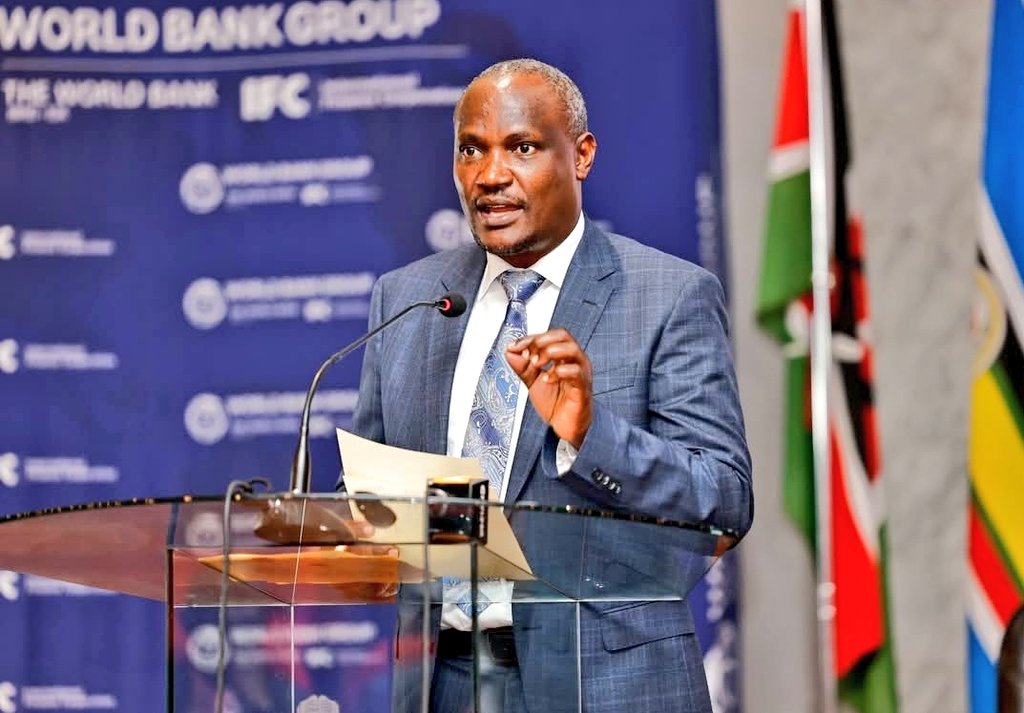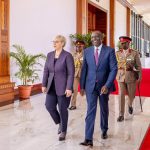On Tuesday, National Treasury Cabinet Secretary John Mbadi, hosted a pivotal breakfast roundtable titled “Making Nairobi the Financial Gateway to Africa.”
The event, which convened key players from the financial services sector, underscored Kenya’s ambitious strategy to attract foreign investment by leveraging the 2025–2026 Budget as a policy instrument.
Against the backdrop of a recovering economy and global economic challenges, Kenya is doubling down on its vision to transform Nairobi into a regional financial hub, with the Nairobi International Financial Centre (NIFC) at the heart of this transformation.
A Strategic Budget to Unlock Investment
During the roundtable, Mbadi emphasised that the 2025–2026 Budget is more than a fiscal plan—it’s a strategic enabler for Kenya’s financial ecosystem.
“From tax policy to digital transformation, we are aligning public finance tools to support innovation and growth in banking, insurance, pensions, fintech, and capital markets,” he stated.
Key measures in the proposed budget include incentives for long-term capital formation through pension and infrastructure funds, regulatory sandboxes to foster innovation, and tax reforms targeting firms within the NIFC framework.
The budget also introduces revised listing rules to deepen capital markets, expanded support for SME financing, and a focus on green finance products—an area of growing global interest.
These reforms come at a critical time. According to a KPMG East Africa report from May 2025, Kenya’s economic growth slowed to 4.6 per cent in 2024 from 5.6 per cent in 2023, largely due to reduced economic activity and sluggish private sector credit growth.
However, the report projects a recovery to 5.3 per cent in 2025, driven by improved agricultural productivity, a robust services sector, and the government’s Bottom-Up Economic Transformation Agenda (BETA).
The budget’s focus on unlocking investment and stimulating productive lending aligns with this optimistic outlook, aiming to create a conducive environment for foreign capital inflow.
The Nairobi International Financial Centre: A Game Changer
Launched on July 4, 2022, under the administration of then-President Uhuru Kenyatta, the NIFC has emerged as a cornerstone of Kenya’s foreign investment strategy.
Designed to create an environment where fintech can thrive and new technologies like artificial intelligence can be mainstreamed, the NIFC is being positioned as a catalyst for attracting global capital.
Mbadi highlighted the role of the Nairobi International Financial Centre Authority (NIFCA) in simplifying licensing processes, promoting Nairobi in major financial hubs, and attracting world-class institutions.
“I encourage all firms represented here to engage with NIFCA and align your strategies for regional and global expansion,” he urged attendees, who included chairpersons and CEOs from banking, insurance, investment, legal, and audit sectors.
The NIFC offers a competitive edge through streamlined regulatory frameworks and dispute resolution mechanisms, making it easier for foreign investors to set up operations in Nairobi.
Additionally, tax and administrative reforms targeted at NIFC firms are designed to reduce operational costs, further incentivising investment.
Kenya’s focus on green finance also taps into the global push for sustainable investments, aligning with international ESG (Environmental, Social, and Governance) disclosure frameworks—a move likely to attract environmentally conscious investors.
Building Trust and Global Integration
A critical component of Kenya’s strategy is fostering trust in its financial markets.
Mbadi emphasised the importance of transparency in public finance, regulatory consistency, and strengthened anti-money laundering safeguards.
The Financial Reporting Centre (FRC), established under the Proceeds of Crime and Anti-Money Laundering Act (POCAMLA) of 2009, plays a key role in this effort.
The FRC’s mandate to combat money laundering, terrorism financing, and proliferation financing aligns with global standards, reassuring foreign investors of the integrity of Kenya’s financial system.
Kenya is also enhancing its global integration through new and renegotiated double taxation agreements, adoption of OECD standards, and alignment with international financial reporting frameworks.
These measures aim to reduce barriers for foreign investors and position Nairobi as a seamless entry point for capital flows into Africa.
By aligning with global best practices, Kenya is signaling its readiness to compete with established financial hubs like Johannesburg and Lagos.
Innovation is a key pillar of Kenya’s strategy to attract foreign investment.
The Capital Markets Authority (CMA) Regulatory Sandbox, introduced in 2023, allows fintech companies and capital market intermediaries to test innovative products in a less onerous regulatory environment.
This initiative has already shown promise in deepening capital markets and fostering financial inclusion—two areas critical for attracting investment.
By supporting fintech innovation, Kenya is positioning itself as a leader in Africa’s digital economy, a sector that has seen exponential growth in recent years.
The government’s focus on digital transformation extends beyond fintech. Investments in digital infrastructure, coupled with the budget’s support for financial inclusion frameworks, aim to expand access to financial services across Kenya.
This not only stimulates domestic economic activity but also makes Kenya an attractive destination for investors seeking exposure to Africa’s growing consumer markets.
Despite these efforts, Kenya faces challenges in its quest to become Africa’s financial gateway.
Global economic headwinds, such as potential retaliatory tariffs stemming from increased U.S. tariffs on Kenyan exports in agriculture, textiles, and mining, pose risks to economic stability.
The proposed Finance Bill, 2025, seeks to cushion the economy against such external shocks, but sustained efforts will be needed to maintain investor confidence.
Moreover, competition from other African financial hubs remains a hurdle. South Africa’s Johannesburg Stock Exchange and Nigeria’s Lagos, with its burgeoning fintech scene, are formidable rivals.
However, Kenya’s strategic location, robust services sector, and proactive policy measures give it a competitive edge.
The government’s call for collaboration with the private sector is a step in the right direction, as
Mbadi noted: “The transformation of Nairobi into Africa’s financial gateway will not be achieved by policy alone. It will be driven by your actions—the products you develop, the risks you underwrite, and the trust you inspire.”
Kenya’s push to attract foreign investment through the NIFC and the 2025–2026 Budget reflects a broader vision to position Nairobi as the financial gateway to Africa.
By fostering innovation, building trust, and integrating with global financial systems, Kenya is laying the groundwork for sustainable economic growth.
The success of this strategy will depend on the government’s ability to execute its plans effectively and the private sector’s willingness to collaborate in driving this transformation.












